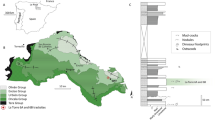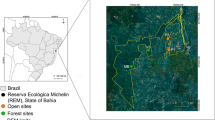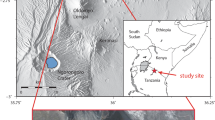Abstract
A method for estimating the speed of a dinosaurian trail-maker from the size of its footprints and stride has been described by Alexander1. However, when applied to known trackways, this method gave rather low speeds (1.0–3.6 m s−1). Russell and Béland2 estimated a speed of 1.77 m s−1 for a slowly moving ornithomimid and 7.54 m s−1 for an allegedly rapidly running ornithopod. The latter estimate is questionable as there is some doubt concerning the number of prints (and thus the stride length) of the trail3,4. Dinosaurs responsible for trackways in British Columbia5, South Wales6 and Queensland7 all seem to have been moving slowly. Thus reliable estimates of dinosaur speeds are all rather low. Here I report dinosaur speeds based on trails at a new site from the Lower Cretaceous of Texas, some of which appear quite fast by Alexander's method1.
This is a preview of subscription content, access via your institution
Access options
Subscribe to this journal
Receive 51 print issues and online access
$199.00 per year
only $3.90 per issue
Buy this article
- Purchase on Springer Link
- Instant access to full article PDF
Prices may be subject to local taxes which are calculated during checkout
Similar content being viewed by others
References
Alexander, R. McN. Nature 261, 129–130 (1976).
Russell, D. A. & Béland, P. Nature 264, 486 (1976).
Thulborn, R. A. Nature 292, 273–274 (1981).
Russell, D. A. Nature 292, 274 (1981).
Kool, R. Can. J. Earth Sci. 18, 823–825 (1981).
Tucker, M. E. & Burchette, T. P. Palaeogeogr. Palaeodimatol. Palaeoecol. 22, 195–208 (1977).
Thulborn, R. A. & Wade, M. Lethaia 12, 275–279 (1979).
Alexander, R. McN., Langman, V. A. & Jayes, A. S. J. Zool. 183, 291–300 (1977).
Russell, D. A. Can. J. Earth Sci. 9, 375–402 (1972).
Bakker, R. T. in Perspectives of Biophysical Ecology (eds Gates, D. M. & Schmerl, R. B.) 365–369 (Springer, New York, 1975).
Coombs, W. P. Q. Rev. Biol. 53, 393–418 (1978).
Hotton, N. in A Cold Look at the Warm-Blooded Dinosaurs (eds Thomas, R. D. K. & Olson, E. C.) 311–350 (A.A.A.S. Selected Symp. 28, Westview, Boulder, Colorado, 1980).
Bakker, R. T. in A Cold Look at the Warm-Blooded Dinosaurs (eds Thomas, R. D. K. & Olson, E. C.) 351–462 (A.A.A.S. Selected Symp. 28, Westview, Boulder, Colorado, 1980).
McWhirter, N. Guinness Book of World Records (Sterling, New York, 1980).
Alexander, R. McN., Maloiy, G. M. O., Njau, R. & Jayes, A. S. J. Zool. 187, 169–178 (1979).
Author information
Authors and Affiliations
Rights and permissions
About this article
Cite this article
Farlow, J. Estimates of dinosaur speeds from a new trackway site in Texas. Nature 294, 747–748 (1981). https://doi.org/10.1038/294747a0
Received:
Accepted:
Issue Date:
DOI: https://doi.org/10.1038/294747a0
This article is cited by
-
What do their footprints tell us? Many questions and some answers about the life of non-avian dinosaurs
Journal of Iberian Geology (2023)
-
Fast-running theropods tracks from the Early Cretaceous of La Rioja, Spain
Scientific Reports (2021)
-
Examining the accuracy of trackways for predicting gait selection and speed of locomotion
Frontiers in Zoology (2020)
-
Tyrannosaurs were power-walkers
Nature (2011)
-
Three-dimensional preservation of foot movements in Triassic theropod dinosaurs
Nature (1999)
Comments
By submitting a comment you agree to abide by our Terms and Community Guidelines. If you find something abusive or that does not comply with our terms or guidelines please flag it as inappropriate.



